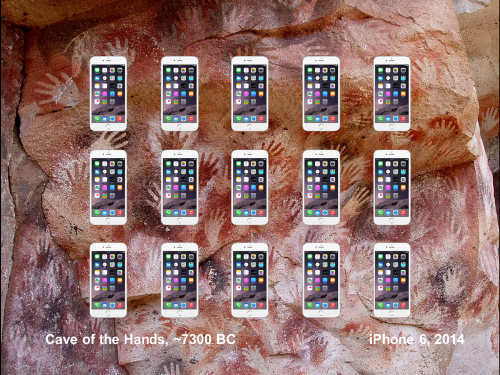The following is a presentation I delivered at an EU Policy Innovation Lab pilot project at the Joint Research Centre in Brussels.
We were asked to talk about social change in a hyperconnected world and I have chosen to focus on myself. Although I am a member of what is occasionally called ‘Generation Me’ I’m talking about myself as a useful example of someone who is both a product and a participant of this hyperconnected world. But in essence we are all complicit: it is all of our participation that makes it a reality.
The word refers to the many avenues of digital communication available to us and the multiple devices through which we connect with others. Generally, it evokes a sense of ultra-modern, fast paced life and, at least for me, whooshing neon lights.
But hyperconnection didn’t appear out of nowhere at the advent of the Internet and mobile devices. Rather, humans have an extremely long history of connection that very recently has become “hyper.”

The Cave of the Hands is 9000-year-old evidence of our quest for connection. The history of communication closely parallels technological developments: bone pipes used to spray paint to create the outlines of hands eventually brought us to touch screen technology used in the iPhone.
We have been hugely motivated to communicate messages, ideas, people, and products over distances. In the 20th century this resulted in great innovation especially in telecommunication and transportation. And, to risk a broad generalization, airplanes are largely responsible for my existence.
My mother is a Dane, my father is a Canadian-Brit, and they met in Guatemala. This is not a story that could have easily been told any time before the 20th century. It is also a story that is becoming increasingly common. When I was born I was given dual citizenship of Canada and Denmark. In the past, dual citizens were viewed with extreme skepticism as “a potential catalyst for treason, espionage, and other subversive activities.” It is a status today which is sometimes still regarded as somewhat questionable, though no longer treasonous. This is reflected in the sketchy statistics available about dual citizens: US estimates range between 500,000 and 5.7 million US dual citizens. The message is clear: stay quiet to avoid bureaucratic difficulties. Though dual citizenship is a reality, and a legal reality, the bureaucracies that created dual citizens often do not know how to handle them.
Apart from the dodgy bureaucratic side of dual-citizenship, it also allows great access to education, travel, work, and, for example, the opportunity for me to intern for the Commission.
My point so far has been to establish that humans are great communicators striving for ever faster, better, more frequent, and more numerous connections and this has already had an impact on the identity and culture of current generations. Enter: the Internet. This is what the “hyper” in hyperconnection is all about. The Internet has made the world spectacularly accessible to the largest proportion of people in the history of the planet, irrespective of citizenship. From entertainment, education, and travel to employment the Internet affects everything.
In 2013 I got an online job. Suitably enough, I found it through Facebook. I moonlight as a moderator for a popular online kid’s game. The majority of what I do is encourage nice behaviour online and penalize users who swear or talk about sex.
I work for a Danish company with headquarters in Copenhagen and Luxembourg. It is supported in 16 countries and I work on the six English speaking sites. I report daily to my manager who is located in New York. In the two years that I’ve had this job I have worked from seven countries in Europe and North America.

My office is my laptop. I can work anywhere with a Wi-Fi connection. For me, the portability has made it a spectacularly practical job. But in dealing with the interested bureaucratic authorities it is rather the opposite. The principle question is where do I pay taxes? Technically I am a registered Danish company so I pay income taxes in Denmark.
But is this an appropriate reflection of the situation? Tax season generally leaves me feeling uneasy largely because of the discrepancy I feel between the options I’m given by the tax people and the realities of my job. It’s worth considering that if taxes are used to pay for services where should I pay taxes? Where do I use services? Where am I contributing to society? Arguably I make more of a societal contribution through my work in Canada and the US than in Denmark. And currently I’m living in Belgium. What’s the difference between online society and countries defined by their geopolitical boundaries? The fact of the matter is current administrative systems can’t, or don’t want to, account for people who work online in potentially multiple countries and live in another.
The existence of highly mobile workers is a relatively new phenomenon but also likely to grow. Rethinking the appropriate response is something worth considering.
Where are you from? This seemingly benign question encompasses many more questions: Where were you born? Where did you grow up? Where did you go to school? Where do you work? Where do you live? Being able to answer this question simply is a victim of the hyperconnected world. But that’s not necessarily a bad thing. We just need to figure out how we want to manage and respond to this situation as a hyperconnected society.
